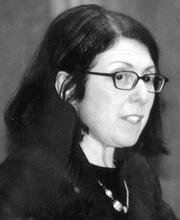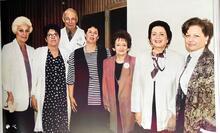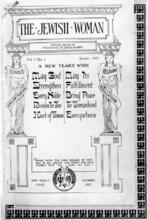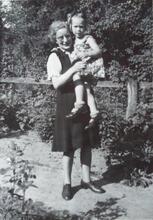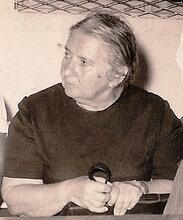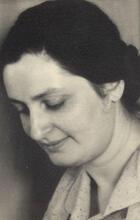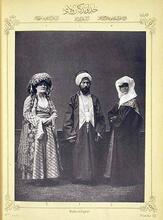Florence Heller
An important benefactress of Brandeis University, Florence Grunsfeld Heller made her mark as one of the first women to run a general Jewish organization, the Jewish Welfare Board. Her many charitable activities included support of medical research and she endowed the Florence Heller Isotope Laboratory and the Florence G. Heller Blood Bank at the Louis A. Weiss Memorial Hospital in Chicago. Her life’s work, though, was the Jewish Welfare Board, for which she served as vice president from 1948 to 1964 and president from 1964 to 1966. Through this work she created a research center for the JWB in conjunction with Brandeis University. She also founded the Florence Heller Graduate School for Advanced Studies in Social Welfare at Brandeis in 1959 and served as a trustee of the university.
Early Life & Family
Florence Grunsfeld Heller, who became a social worker, volunteer leader in Chicago, and benefactor of Brandeis University, was born in Albuquerque, New Mexico, on March 2, 1897, the daughter of Ivan and Hannah (Nusbaum) Grunsfeld and the granddaughter of Albert and Heldegarde (David) Grunsfeld. Her parents and grandparents were German immigrants who came to the United States in 1873, settling in the territory of New Mexico. Her father was a wholesale merchant. Her initial years of schooling in Albuquerque were followed by years at Bradford Academy in Boston, Massachusetts, and the Faulkner School for Girls in Chicago, Illinois. In Chicago, at age sixteen or seventeen, Florence Grunsfeld lived with her maternal uncle, Julius Rosenwald—the founder of Sears Roebuck and Company—and his wife. Florence Heller’s son Peter credits the Rosenwalds with instilling in her a strong devotion and sense of obligation to society.
According to a family legend, Florence met her future husband, Walter E. Heller, at a formal dance when he was wearing a purple tuxedo. Walter Heller was chair of the board of Walter E. Heller and Company, a firm in the financial industry. They were married in Chicago on February 22, 1917, just before Florence turned twenty. They had three sons: John Andrew, Peter Eugene, and Paul Walter. Their marriage ended in divorce in 1953.
Early Philanthropic Work
Heller’s primary activities as a philanthropist and organizational leader were in Chicago. As a volunteer in the 1920s, she served individuals in need of relief at the United Jewish Charities in Chicago. Not long afterward, she became involved with settlement work, serving new immigrants to the United States through the Jewish Peoples Institute. From 1923 to 1941, she served as president of its women’s auxiliary.
During World War II, her activities extended beyond the Jewish community, leading her to work with the United Service Organizations (USO) in helping to provide ancillary services to American servicemen both in the United States and overseas. As chair of the management committee of the Central USO Club of Greater Chicago, she led one of the most active branches of that organization.
The Jewish Welfare Board
The National Cyclopaedia of American Biography links Heller’s “intense interest in social welfare work” with her involvement with the national Jewish Welfare Board (JWB). From 1948 to 1964, she was vice president; from 1964 to 1966, she was the president. She represented the JWB to the United Nations Conference Group of Non-Governmental Organizations. Her New York Times obituary recognizes her as the first female president of a general national Jewish organization.
The JWB offered a forum for Heller’s growing interest in the training of aspiring social workers. She helped to establish a research center for the JWB in conjunction with Brandeis University and served as a trustee there. In 1959, she concretized her commitment to the training of social workers in the gift of a million-dollar endowment to found the Florence Heller Graduate School for Advanced Studies in Social Welfare at Brandeis. She also served as a trustee of Brandeis University.
Support of Medical Research & Other Organizations
In Chicago, her philanthropic inclinations also found a home in an endowment for the Florence Heller Isotope Laboratory and the Florence G. Heller Blood Bank at the Louis A. Weiss Memorial Hospital. She was also a member of Chicago Women’s Aid, Mother’s Aid to Chicago Lying-In Hospital, Infant Welfare of Chicago, the Art Institute of Chicago, and the Field Museum of Natural History.
She contributed to the international Jewish community through her membership on the board of the World Federation of Young Men’s Hebrew Associations and Jewish Community Centers. As an early supporter of the Jerusalem YM-YWHA, she attended the groundbreaking ceremonies there in 1964. She served as treasurer and board member of Sinai Temple in Chicago.
Florence Heller died in Chicago, on January 5, 1966.
AJYB 68 (1967): 528.
Heller, Peter E. Correspondence with the author, September 26, 1995.
National Cyclopaedia of American Biography. Clifton: J. T. White, 1969.
NYTimes, January 6, 1966, 27:4, July 10, 1976, 26, July 11, 1976, 45, and July 12, 1976, B2.
WWIAJ (1928, 1938).
WWIA 5.

